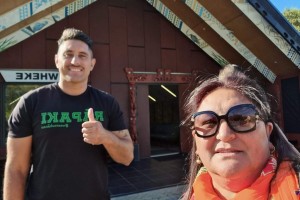
OPINION: Developing a prosperous workforce for whānau and whenua
ekea kā tiritiri o te moana
ascend and climb to the heights of your aspirations!
by Joseph Tyro (Ngāi Tahu, Te Ati Haunui-A-Pāpārangi, Ngāti Rangi) , Mekura, Malia and Teone Wiwi Hohepa Turanga Tyro
The greatest asset and taonga that exists within the health system, are the workforce within it tirelessly serving our community. The health workforce as a collective makes up the largest collective workforce in New Zealand, making up over 260,000 staff. The workforce has also worked through Covid-19 and is now working through the largest health reforms of our generation, to address the long-standing health inequities for tangata whenua Māori and other ethnic groups. Additionally, there are significant workforce shortages internationally and nationally placing enormous pressures on our current health system. Despite the multiple challenges that exist in the sector and immense resilience displayed by our workforce, there is also enormous potential and opportunities that present itself.
In this blog I will share some of my experiences and thoughts on developing a prosperous workforce for whānau and whenua and overcoming barriers within it.
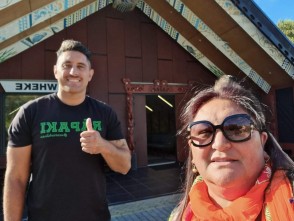 (Joseph, left with his mum Pani)
(Joseph, left with his mum Pani)
I have been privileged to have been born and raised in a village, my tūrangawaewae, community, where I was surrounded by many great people, who I always aspired to be like. My village included my whānau, grandparents, kaumatua, papatipu marae, community leaders, All Blacks, Lyttelton rugby, Waitaha & NZ māori rugby, kumara patch, community boards, friends, and many others, which have all had a role in shaping me into the person I am today. So being close and serving the community that raised you, your Tūrangawaewae and whenua who raised me, gives me a true sense of connection and belonging. I was fortunate to be surrounded by leaders in my community, who I observed as charismatic, loving, and embracing the collective values and spirit of what community is. Being close to my papatipu where I can climb my maunga to connect with my tupuna and to bathe in the moana/puna to revitalise and replenish my wairua, are ways that have helped me develop and grow at a personal/cultural/wairua level.
Wherever I am I will always encourage whānau to return to your kainga or wherever ‘home’ is for you, to restore and replenish your connections, strength and wairua. I believe once you are grounded and centred at a personal and cultural level, through upholding the mauri of your tupuna, pumanawa, whakapapa, ngā taonga tuku iho and to believe in yourself and be proud of who you are, this provides a platform for where you can grow. When you are grounded in your own Tino Rangatiratanga and mindset, you can then be in a place to develop and master professional skills and technical skills in or whatever that may be.
Communities are so important for development and growth, especially communities that are psychologically and culturally safe, and allow a ’space’ where you can truly develop, grow, and flourish, and be the best versions of yourself. Entering the health workforce, was a challenge where I had to overcome multiple barriers and hurdles, no different to many others. Long story short I failed everything in school, I could not speak Māori, I did not know my whakapapa. Although I had aroha and love around me from my whānau I did not know who I was, or where I was going as a person.
When you are used to failure, it becomes normal, and becomes a part of who you are. The only way I felt accepted was to fit in with my friends, and that was to basically be as tough as possible, to knock people out and take what you want. So yeah, everything is all good until you get punched in the head. For me that is all I wanted to do and was the only way I felt accepted amongst my friends and community. In reflection it is hard to grow and develop when your environment is not right and every day you are just trying to survive.
Then one day one of my best friends said come to university as a mature student (20), you can get in. I did not know what a university was! However, this was my opportunity. University was where I learnt how to read, write, and started to learn. At the beginning it was one of the most embarrassing, shameful experiences in my life, trying to understand and fit into this system. But it was also the most gratifying part of my life as well after completing my master’s in social work.
I started to think and see the world differently, and my transformational change came through education and then shifted to transformational change through vocation/employment, where skills can be learnt, I was able to recreate my narrative. I shifted my thinking from victim mindset to a growth mindset, and not allowing my past to dictate my future. Learning to be okay to be uncomfortable where your attitude is your most important choice, especially how you react and approach the world and environment around you. While also being grounded and accountable to my tupuna and through actioning my values.
Being active in my community is where I get my greatest enjoyment and fulfilment. I am lucky enough to be a part of
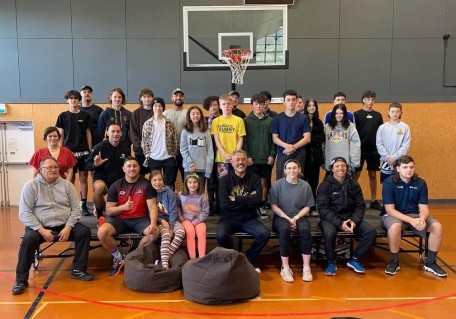 the Lyttelton Youth Group (Joseph, 2nd fr left, seated, with the Lyttelton Youth Group), where I first started volunteering as a youth worker at 16, helping run the holiday programmes. I am lucky enough to be still apart of this programme to this day alongside my cousin Jordan and childhood friend Nathan.
the Lyttelton Youth Group (Joseph, 2nd fr left, seated, with the Lyttelton Youth Group), where I first started volunteering as a youth worker at 16, helping run the holiday programmes. I am lucky enough to be still apart of this programme to this day alongside my cousin Jordan and childhood friend Nathan.
Te Korowai Atawhai is another important place for me at a clinical/professional level. In my clinical mahi I would often go to Te Korowai Atawhai to visit Pukenga Atawhai (Ruru, Dean, Vi, Mokena, Leslie, Henare, Te Pora, Mike, and many others), who provided me with cultural guidance, support, and strength, so I could go back to my clinical teams. This cultural supervision and support helped make sense and helped process my experiences of racism and isolation in the system. When I first arrived, I was like a rough pounamu and they cut, shaped, and polished me into the person I am today. What they all taught me is something I try to share and emulate with others.
In 2019 I was accepted in a role with the South Canterbury District Health Board as the Director Māori Health. After 20 years of service in the health sector and Oranga Tamariki, I felt in my heart I was ready to start stepping up. I was supported by many people which included Upoko Runaka matua Tewera, kaumatua whaea Raeleen, Hush, Ani, Ruth, Lavinia, Pauline, Sina, SCDHB whānau and many others. In 2020 we developed and rolled out a kaupapa māori leadership programme for all our Māori workforce within the hospital – to accelerate and illuminate Māori leadership capability and capacity. We partnered with mana whenua, and we made spaces available for other Māori within government agencies including NZ Police, Oranga Tamariki, Corrections, Ministry of Justice, MSD, NGO, marae, and community. There was no cost the only commitment required was to attend 3x noho marae and groups hui wananga over a 3-month period. This was our koha to our māori community and a way to do things differently to strengthen our relationships. This was a way to break down traditional structures and embed a distributive leadership whakaaro where everyone has a role, purpose, and mana. This leadership programme was the first of its kind in the health sector, where we had 33 tangata whenua completing the programme and graduating. Matua Ballard our lead facilitator left with us this -- ‘I was, I am, I can, and I will’.
Additionally, we also developed Kia Tika te Ara (Correcting the path) a 3-day mandatory cultural safety programme integrated into monthly orientation for new staff, through powhiri on marae. Upoko Tewera King supports the programme where we walk through Te Tiriti o Waitangi, cultural humility, te reo, tikanga best practice and many other key kaupapa. It was our way and vision of connecting our workforce to our Māori community. Alongside this we created Toa Mana Taurite – Equity Champions Network. This programme helps lifts the standards and culture we expect within our hospital through normalising te reo and privileging te ao and matauranga Māori.
Growing our Māori and Pasifika workforce has been another key initiative, and the only way we are going to achieve this is through a pro-equity response through policy and through active partnership with our Māori and Pasifika communities, such as Arowhenua Whānau Services, South Canterbury Tongan Society, Multicultural Aoraki and MSD. We actively created positions and grew kaiawhina workforce with these roles now built into our system. We did all these programmes by ourselves with only very limited funding and resources and no allocated fte. My mindset is there is always potential and opportunity, sometimes you just must create something out of nothing.
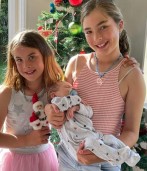 I hope you have enjoyed my short story about how I reclaimed my identity, about who I am and the journey to serve
I hope you have enjoyed my short story about how I reclaimed my identity, about who I am and the journey to serve 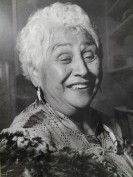 and uplift my whānau and community. My tāua/grandmother Mekura Tuatini Taiaroa, pictured right, was one of my inspirations to work in health, and she took me and my sister everywhere with her.
and uplift my whānau and community. My tāua/grandmother Mekura Tuatini Taiaroa, pictured right, was one of my inspirations to work in health, and she took me and my sister everywhere with her.
So, I have included my children (Mekura, Malia and Te One Wiwi Hohepa Turanga, left) in the writing of this blog so they can not only understand something about their father that they may not have known, but also to help them see the world differently.
These last few words I will leave with you to help just open a small window into how I see the world.
- Make the person in front of you better than yourself
- Be accountable to your values
- Remain humble
- Hang around people who are going places
- Learn to live a deliberate and intentional life
- Do not let your career define who you are or who you will be as a person
- Learn to love yourself
- When things get tough tell yourself you are amazing, that you are loved and you can do this
- Be the best dad, mum, brother, friend, uncle, neighbour that you can be
- Whatever you do as long as it’s done with aroha, you cannot go wrong
- Mahia te mahi
- Stand in the mauri and essence of your tupuna
- Whatever your vision put a plan in place, and remain steady and consistent on that plan/goal.
- Stand with purpose in what you believe in
- How do you want to be remembered?
- Live a purposeful and deliberate life
- If you really want something, go and get it
- Shift mindset form competition and competing, to uplifting others
- Be a great tupuna
(Joseph Tyro is Principle Advisor Workforce at Te Aka Whai Ora. He has years of experience in serving the South Island and Canterbury District as Director of Māori Health, through his many governance positions, and also as a lecturer.)